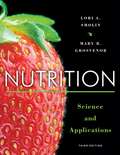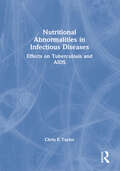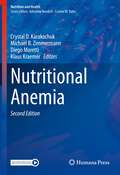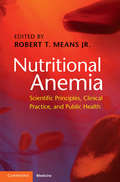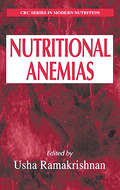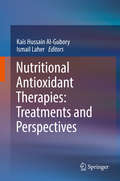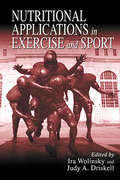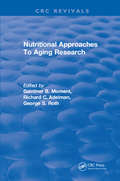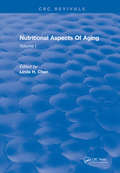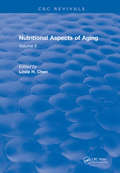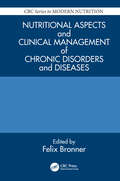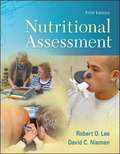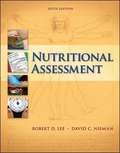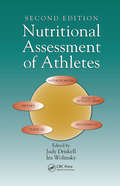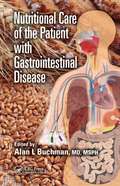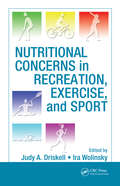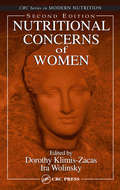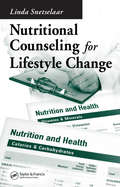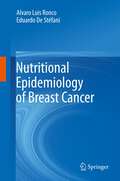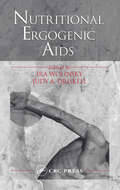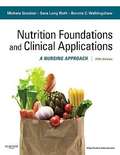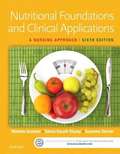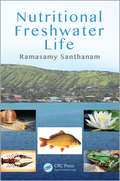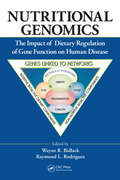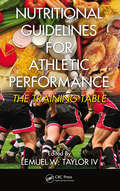- Table View
- List View
Nutrition: Science And Applications
by Lori Smolin Mary GrosvenorNutrition: Science and Applications, 3rd edition helps develop the scientific understanding to support personal and professional decisions. Using a critical thinking approach, Smolin brings nutrition out of the classroom and allows students to apply the logic of science to their own nutrition concerns both as consumers and as future scientists and health professionals. The text has been developed through collaboration between the authors and the Nutrition Advisory Board, a team of dedicated nutrition instructors who help review and develop all of Wiley’s nutrition resources.
Nutritional Abnormalities in Infectious Diseases: Effects on Tuberculosis and AIDS
by Chris E TaylorListed in the 1997 edition of Doody’s Rating Service: A Buyer’s Guide to the 250 Best Health Sciences Books!Until recently, it had been presumed that chemotherapy was sufficient to control tuberculosis (TB). However, it has been estimated that this disease will claim more than 30 million lives in the coming decade. The emergence of multidrug resistant strains, the lack of patient adherence to therapy, and the resultant growing number of TB cases has made it clear that alternative approaches to fight this disease must be taken. Nutritional Abnormalities in Infectious Diseases: Effects on Tuberculosis and AIDS focuses on nutritional factors in relation to tuberculosis and AIDS to help you better understand and treat these diseases. Health care providers and researchers can refer to this valuable resource to identify the most crucial nutritional determinants involved in the control of TB, outline the nutrient-sensitive host defense mechanisms involved, define the effects of malabsorption and drug-drug interactions, and demonstrate the effects of co-infection with HIV on the incidence of TB.Representing the findings of a symposium held during the 94th General Meeting of the American Society for Microbiology, in Las Vegas, Nevada, Nutritional Abnormalities in Infectious Diseases is the work of several outstanding scientists who were invited to make presentations on selected aspects of nutrition and infectious diseases. They give you valuable information about: the effects of malnutrition on host immune parameters intracellular host defense mechanisms phagocytosis the role of cytokines the immune function vitamin A, zinc, and protein deficiency malnutrition and the developing worldWhile the role of adequate nutrition in maintaining a healthy individual is certainly well-known, the findings in Nutritional Abnormalities in Infectious Diseases uncover the role of nutrition in the progression of tuberculosis and AIDS--a matter of great economic and public health significance. Intended for researchers, practitioners, and health care providers in colleges, universities, and government institutions, this important session was sponsored in part by the Respiratory Disease Branch, Division of Microbiology & Infectious Diseases, NIAID.
Nutritional Anemia (Nutrition and Health)
by Klaus Kraemer Crystal D. Karakochuk Michael B. Zimmermann Diego MorettiUnderstanding the causes of anemia is critical to inform appropriate strategies to prevent and treat anemia, particularly to reduce the risk of anemia and the burden of disease. The strength of this book lies in its cross-disciplinary nature. This publication summarizes the current state of evidence on the multifactorial causes of anemia, with a specific focus on nutritional anemia. The chapter authors are leading experts in nutrition and global health. The introductory chapters provide an overview of the global burden of anemia prevalence, the economic implications and functional consequences of anemia, and the significance of these factors to guide policy and programs. Subsequent chapters provide current evidence on iron and other micronutrient metabolism and homeostasis in regards to anemia, the multifactorial contributors to anemia (e.g. infection and genetics), and the interactions between nutrients that may contribute to anemia. The summarizing chapters detail program and policy approaches to treat, prevent and reduce anemia in the global context. Nutritional Anemia is a comprehensive resource for those involved in global health and nutrition policy, strategy, programming, or research, and serves as a guide for how government, NGO, and international agencies can effectively treat, prevent and reduce anemia globally.
Nutritional Anemia: Scientific Principles, Clinical Practice, and Public Health
by Robert T. Means JrThis major new comprehensive guide focuses on particular topics in the field of nutritional anemias, with in-depth coverage on each relevant nutrient whose deficiency can cause anemia, their metabolism, dietary requirements and related information. This book presents the unique hematological, and non-hematological, manifestations of each deficiency, the varied settings and causes of deficiency, interactions with other problems, diagnostic approaches and tools, synthesizing the perspectives of epidemiology, public health, and clinical hematology. Covering approaches to medical management in individuals, as well as in susceptible populations such as children, pregnant women and the elderly; and preventive strategies, such as supplementation and fortification, this exceptional text will appeal to a wide audience, from the clinician learning about the epidemiology and public health aspects of food fortification, to the public health practitioner who needs to understand clinical approaches to key nutritional anemia issues.
Nutritional Anemias (Modern Nutrition)
by Usha RamakrishnanAnemias resulting from nutritional factors constitute the largest nutrition health problem affecting populations in both developed and developing nations. Nutritional Anemias examines these anemias in detail and offers a balanced approach that includes current research findings on the etiology and consequences of this important problem. Th
Nutritional Antioxidant Therapies: Treatments and Perspectives
by Kaïs Hussain Al-Gubory Ismail LaherThis book offers a collection of expert reviews on the use of plant-based antioxidant therapies in disease prevention and treatment. Topics discussed include the uses of plant and nutritional antioxidants in the contexts of reproductive health and prenatal development, healthcare and aging, noncommunicable chronic diseases, and environmental pollution. The text is complemented by a wealth of color figures and summary tables.
Nutritional Applications in Exercise and Sport (Nutrition in Exercise & Sport)
by Judy A. Driskell Ira WolinskyA comprehensive compilation of applied topics, Nutritional Applications in Exercise and Sport discusses issues related to the life cycle, group-specific nutritional concerns of athletes, and the particular sport of the athlete. It addresses the physically and medically disabled athlete, athletes addicted to alcohol, tobacco, or marijuana, and those with eating disorders. The book also focuses on the nutritional applications of exercise and sport rather than the usual treatment of nutrient-specific metabolism. Studies and tables clearly illustrate the concepts and provide quick and easy access to the information readers need to put theory into practice. It serves as a companion resource to books that take a nutrient/metabolism specific approach.
Nutritional Approaches To Aging Research
by George S. Roth Gairdner B. Moment Richard C. AdlemanThe general plan of this volume, Nutritional Approaches to Aging Research is for each chapter to present first a reasonably succinct state-of-the-art appraisal of present knowledge in the particular field or problem covered. This will vary considerable depending on the subject matter. Following this, each chapter will focus on the problems and pitfalls, both conceptual and technological, of work in the particular field and, no less important, present some of the opportunities and implications of work in that particular area.
Nutritional Aspects Of Aging: Volume 1
by Linda H. ChenThe first section in Volume 1 describes the fundamentals of nutrition and aging which include research strategies for the study of nutrition and aging. The nutritional modulation of the aging process which has provided a major breakthrough in the field of nutrition and longevity is also discussed. These include biomedical influences, and social and psychological aspects. Section 3 includes dietary characteristics of the elderly population and methods for the assessment of nutritional status. The nutritional status of the elderly with respect to individual nutrients as determined by dietary survey and by biochemical methods is described in Section 4. Section 4 also includes discussion on nutrient metabolism, requirements, nutritional imbalances, and deficiencies of nutrients. Energy metabolism and obesity as a factor in pathogenesis of diseases are also discussed.
Nutritional Aspects Of Aging: Volume 2
by Linda H. ChenIn the first section of Volume 2, toxicological factors affecting nutritional status are discussed. Medications and alcohol may affect nutritional status. Section 2 provides a discussion of nutrition-related diseases which occur more frequently among the elderly. Cardiovascular diseases including coronary heart disease and cerebrovascular disease are the leading causes of death in the U.S. The relative importance of cardiovascular diseases, in terms of all deaths for the given age group, rises steadily with age. The death rate from these diseases is 28% for the middle age group (35 to 44) and is 69% for the old age group (age 75 and above. This reflects the continued progression of artherosclerosis with aging. Cancer is the second leading cause of death in the U.S. The death rate from cancer also rises steadily with age. The death rate from diabetes mellitus increases progressively with age and more rapidly after the age of 45. The incidence of diabetes mellitus is 0.23% under age 25 and 6.2% over 45.
Nutritional Aspects and Clinical Management of Chronic Disorders and Diseases
by Felix BronnerPremature births, musculoskeletal diseases, diabetes mellitus, and psychiatric disorders. Nutrition plays a direct or indirect role in the causes, treatment, and/or management of many chronic disorders and diseases, yet nutritional and dietary intervention is often left solely to paramedical staff. This book shows why nutritional and dietary interv
Nutritional Assessment
by Robert D. Lee David C. NiemanThis text describes the four major methods of nutritional assessment (dietary, anthropometric, biometric, and clinical) in an understandable and contemporary way. It thoroughly covers assessment of the hospitalized individual, but also serves as an invaluable resource to the nutrition professional working in such areas as public health and community nutrition, corporate health, and sports medicine.
Nutritional Assessment 6th Edition
by Robert D. Lee David C. NiemanThis text describes the four major methods of nutritional assessment (dietary, anthropometric, biometric, and clinical) in an understandable and contemporary way.
Nutritional Assessment of Athletes
by Judy A. Driskell Ira WolinskyNutritional assessment is a key to determining the health and performance efficiency of professional, collegiate, and recreational athletes. Expanded to include new chapters, the second edition of Nutritional Assessment of Athletes examines the dietary, nutritional, and physical needs of athletes and describes critical biochemical and cli
Nutritional Care of the Patient with Gastrointestinal Disease
by Alan L BuchmanNutritional management is an integral part of the management for virtually all gastrointestinal diseases. Nutritional Care of the Patient with Gastrointestinal Disease fills a current void in nutritional education by providing a reference for diagnosing and managing common nutritional issues related to gastrointestinal disease. Its separation into
Nutritional Concerns in Recreation, Exercise, and Sport
by Judy A. Driskell Ira WolinskyAthletes, coaches, and recreationalists are continually seeking ways to maximize their competitive efforts in both exercise and sport, and from 5km runners to Olympians, most athletes recognize that good nutrition is as crucial to success as ongoing practice and regular exercise. Written and edited by top-notch nutrition and exercise authorities, N
Nutritional Concerns of Women
by Ira Wolinsky Dorothy Klimis-ZacasWomen's health and nutrition concerns have moved to the forefront of research with the mandate by the National Institutes of Health to include women in formerly male-only studies assessing responses to diet and disease. This second edition of a popular and highly praised resource provides new research results that detail the prevalence of and diffe
Nutritional Counseling for Lifestyle Change
by Linda SnetselaarNutrition plays a role in the causes, treatment, and/or management of many chronic diseases, yet the physician's primary responsibility is to treat through medication. Translating research findings and clinical experience into practical treatment recommendations, the book focuses on alleviating chronic illnesses with nutritional support and interve
Nutritional Epidemiology of Breast Cancer
by Alvaro Luis Ronco Eduardo De StéfaniThe book is the first one published exclusively on the field of nutritional epidemiology of breast cancer. It summarizes the currently existing knowledge, with an updated and comprehensive international bibliography (~ 1.000 references). The authors also performed a review on the epidemiological studies on nutrition and breast cancer carried out in Uruguay between 1994 and 2011, which allowed exploring and identifying the main risk and protective factors for the disease in this high-risk country. Epidemiologists, Nutritionists, Public Health managers and breast specialists -from the prevention to the treatment fields - will find in this book a unique source of technical information, which will contribute in expanding their knowledge and view of the disease.
Nutritional Ergogenic Aids
by Irawolinsky Judy A DriskellNutritional Ergogenic Aids provides an up-to-date review of what is hypothetical and what is known about the most extensively used nutritional ergogenic aids; dietary supplements to enhance physical and athletic performance. Among the 23 aids discussed are branched-chain amino acids, carnitine, creatine, glucosamine, chrondroitin sulfate and taurine. An up-to-date review about what is hypothetical and what is known about the most extensively used ergogenic aids.
Nutritional Foundations and Clinical Applications: A Nursing Approach (Fifth Edition)
by Sara Long Roth Michele Grodner Bonnie C. WalkingshawThe 5th edition of the Nutritional Foundations and Clinical Applications, A Nursing Approach offers you a comprehensive, first-hand account of the ways in which nutrition affects the lives of nursing professionals and everyday people.
Nutritional Foundations and Clinical Applications: A Nursing Approach, Sixth Edition
by Michele Grodner Sylvia Escott-Stump Suzanne DornerLooking at nutrition and nutritional therapy from the nurse’s perspective, Nutritional Foundations and Clinical Applications: A Nursing Approach takes a wellness approach based on health promotion and primary prevention. It offers guidelines with a human, personal touch, using first-hand accounts to show how nutrition principles apply to patients in real-world practice. This edition includes new chapters on the effects of stress on nutrient metabolism and on nutrition for neurodegenerative disorders such as Alzheimer’s and Parkinson’s disease. Written by educators Michele Grodner, Sylvia Escott-Stump, and Suzie Dorner, this leading nutrition text promotes healthy diets and shows how nutrition may be used in treating and controlling diseases and disorders.
Nutritional Freshwater Life
by Ramasamy SanthanamSupplying sustenance for millions of the poorest people in the world, freshwater flora and fauna also contribute to overall economic well-being by means of export commodity trade, tourism, and recreation. As sources of high-quality nutrients, freshwater flora and fauna of edible value represent a viable option for alleviating the problems related t
Nutritional Genomics: The Impact of Dietary Regulation of Gene Function on Human Disease
by Raymond L. Rodriguez Wayne R. BidlackThe notion of matching diet with an individual's genetic makeup is transforming the way the public views nutrition as a means of managing health and preventing disease. To fulfill the promise of nutritional genomics, researchers are beginning to reconcile the diverse properties of dietary factors with our current knowledge of genome structure and g
Nutritional Guidelines for Athletic Performance: The Training Table
by Lemuel W. Taylor IVBasic nutrition requirements and proper training are the two most important factors for athletes to achieve peak performance levels. This volume addresses these needs on a comprehensive basis from a training table perspective. Offering practical guidelines for practitioners and athletes, the book focuses on the key macronutrients that fuel daily metabolism and exercise training, and explores differing needs for various athletes and their individual goals. It discusses how to determine body weight for a desired body fat percentage, recommended calorie consumption, dietary suggestions, and useful meal planning tools for a wide variety of caloric needs.
